We’re about to enter into a new era for competitive Magic.
From Elaine Chase’s article on the next chapter for Magic:
“2019 is going to be the biggest and most exciting year in Magic’s 25 years of competitive gaming history as we evolve our organized play program into an esports structure that takes the legacy of our pioneering tabletop system and integrates Magic’s new digital platform, MTG Arena.
There’s a $10 million prize pool up for grabs in 2019 across digital and tabletop Magic, which is more than double 2018. The new system provides lucrative opportunities for pros, players, sponsors, and esports partners.
We’re also introducing the Magic Pro League, creating a new level of professional play. The inaugural year of the MPL comprises 32 of Magic’s top-ranked players from around the world who are each offered player and streamer contracts with a combined worth of $75,000. They’ll be competing in seasonal weekly competitive match-ups on MTG Arena, and in Mythic-level tournaments in both MTG Arena and tabletop.“
Players for the MPL were selected by the 2017-2018 Pro Point standings, but Andrew Baeckstrom and Kelvin Chew declined to participate. Rei Sato and Lee Shi Tian agreed to take their places.
There are only four people in the entire MPL I haven’t played against in a tournament: Rei Sato, Piotr Glogowski, Jean-Emmanuel Depraz, and Andrea Mengucci (although we’ve tested together before and played several draft matches). I’ve also been playing competitive Magic for a long time and have tested with many different teams, so I know most of these players quite well. For those I didn’t know, I went straight to the source!
Allow me to introduce you to the inaugural participants in the Magic Pro League.
Alexander Hayne – Canada
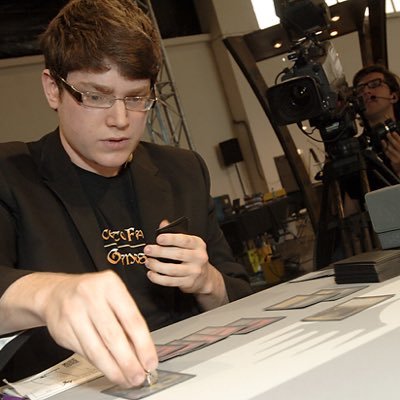
(Pronounced like “pain.”)
How he got here:
At first, Alex didn’t travel outside the East Coast for GPs, but once he got a taste for the competitive side of things, he didn’t stop. A handful of Pro Tour qualifications eventually lead him to Barcelona, where he capitalized on his lone Top 8 by winning the entire tournament. Since then, he’s been a fixture at most North American GPs and every Pro Tour, and has frequently been Platinum.
Alex has accomplished everything through consistency. He might not always put up big finishes, but you can usually find him going deep into any tournament he registers for. Some people have truly catastrophic events, but Alex doesn’t seem to have that problem. The floor on his playskill is higher than most and his ceiling higher still.
What he’s known for:
When I first met Alex, he struck me as a quiet, polite kid who is now less quiet. That usually happens when you get a confidence boost from knowing that you are undoubtedly one of the best in the world at something. It’s possible to hear Alex’s distinct laugh across an event hall, but even if you don’t, you know he’s gaming and cracking jokes with his friends, showing off his trademark grin.
Why you should follow Alex on Twitter:
The Canadian pride, great insight, and biting wit.
Brad Nelson – United States
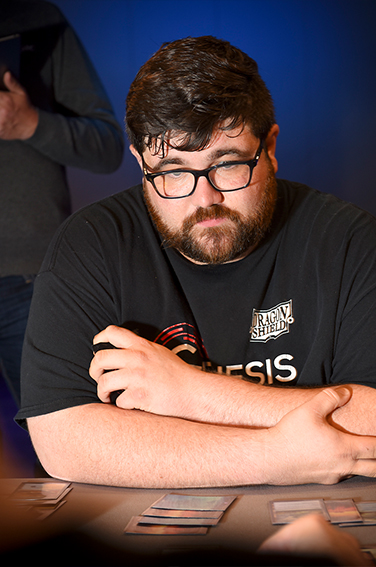
How he got here:
Hard work defines Brad Nelson. He burst onto the scene with a ninth-place finish in his first Pro Tour. After that, he became Player of the Year by defeating Guillaume Matignon in the first ever POY playoff. After that, ego took over. Success seemingly came easy to Brad, so he stopped working as hard as he used to and had a couple of rough seasons as a result.
Brad realized that while he had immense talent and potential, he needed to put his nose back to the grindstone if he wanted to reclaim his former glory. From there, he basically reinvented himself. Moving to Roanoke, VA to pursue Magic full-time may have been exactly what he needed, as it gave him a way to make Magic content (fully engrossing himself in the game) and surround himself with other excellent Magic players like Brian Braun-Duin (BBD), who constantly strive to better themselves and each other.
What he’s known for:
“King of Standard” will almost assuredly be engraved on his tombstone, whether he wants it or not.
Really, though, I would say his table presence is his greatest asset in tabletop play, which is basically irrelevant online. He’s intimidating, plays with confidence, and gives nothing away. However, before Brad was crushing GPs and PTs, he was tearing up Magic Online. Brad is basically great at everything Magic-related, and this might be a return to his true comfort zone.
That’s terrifying.
Why you should follow Brad on Twitter:
Wholesome discussions with his grandma, cat pictures, and general positivity are what you’ll find in Brad’s Twitter feed. You could do so much worse.
Brian Braun-Duin – United States
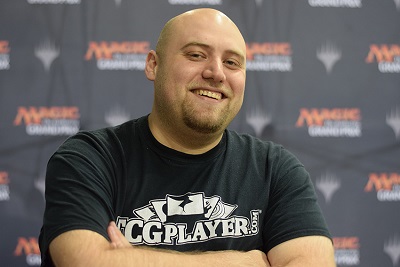
(Pronounced “Brown-Doin,” like “How you doin’?”)
How he got here:
It doesn’t matter what format it is or what strategies are the best. Give BBD a midrange or control deck and he will thrive. Sometimes he’ll demonstrate his range by playing a complicated combo deck like Storm or Ironworks. Despite having success in basically every area of Magic, that single great Pro Tour finish has thus far eluded him. A great draft record can be ruined by a mediocre Standard performance and vice versa, and so far, BBD hasn’t been able to string together the success in both formats at the same time.
Except, of course, for when he won Worlds.
Not qualifying for Worlds the following year reinvigorated his drive and he made it back last year thanks to a plethora of solid performances. I expect the MPL to be just another arena that BBD will conquer.
What he’s known for:
Bad puns. Very, very bad puns.
(And perfectly navigating a marathon three-hour Bant Company mirror match against Marcio Carvalho in the finals of Worlds.)
Why you should follow BBD on Twitter:
BBD will often always tackle community issues with his unique disarming humor, which is a refreshing perspective in a community that often takes itself a little too seriously. If you don’t mind having to make the occasional audible groan, he’s a quality follow.
Gerry Thompson – United States
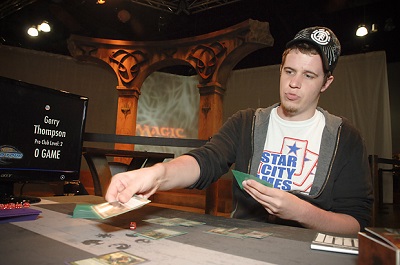
(Pronounced like “Jerry.”)
It me!
How he got here:
Honestly, I don’t know. At one point, I was casting Thorn Elementals on the floor at the end of the lunch room in high school and now I’ve been creating Magic content for over a decade.
The truth is that it was a pursuit of knowledge. If there’s something I’m interested in, I want to know everything about it. I’m incapable of doing anything casually. Magic gave me an outlet for that hunger and I’ve been feebly attempting to learn everything I can about the game, even now.
Part of that exploration is using tournaments as a learning tool rather than always bringing the best deck and trying to win. Sometimes a theory works out (see: Mardu Pyromancer), but far too often than not I’m bringing a knife to a gun fight. As it turns out, I got incredibly lucky to get here.
What he’s known for:
Most people would say tuning decks, liking pizza, or my stupid hair, so that probably means I suck at branding. I also have a podcast.
Why you should follow me on Twitter:
If you want to ask me any sort of question, Twitter is the best way to get ahold of me, and I try to answer everyone. I occasionally share sweet decklists too!
Grzegorz Kowalski – Poland
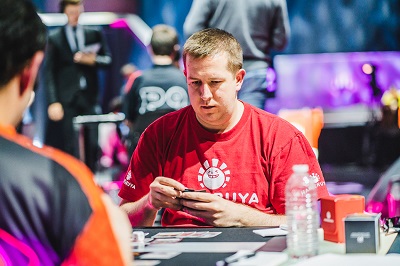
(He says to just call him “Greg.”)
How he got here:
After qualifying for his first PT in 2011, he worked tirelessly in order to get back and become a Magic professional. Since 2015, he hasn’t missed a PT, has joined up with Martin Juza and the rest of Team ChannelFireball, and has continued to utilize that work ethic to great success.
In his own words:
“Playing Magic professionally requires a lot of play-testing hours, and you can’t really skip that part, but I think the biggest difference is in a player’s head. Mindet and work ethic are everything. You can jam games for 20 hours per day and not get much out of it, or you can play for a few hours with a good plan in head, take notes, think about stuff during the games, and get way more. I often see people who can’t admit they made a mistake. They always answer like ‘It didn’t matter’ or ‘Whatever, I couldn’t win anyway.’ This is the worst approach, as you never learn anything. People do make mistakes. The biggest skill is to learn from them. If you want to be good at Magic, put your ego down. Don’t focus on your win rate. Focus on your plays and improve your game.“
What he’s known for:
A finals appearance at Worlds last year has been Greg’s biggest achievement, but it’s one of many. With his natural talent, positive attitude, and drive to improve, it’s only the beginning.
To me though, he’s the epitome of grace and class, and I make it a point to give him a high-five whenever I see him.
Why you should follow Greg on Twitter:
Because you need an entirely positive, genuinely happy-to-be-here Magic pro in your timeline. You just don’t know it yet.
John Rolf – United States
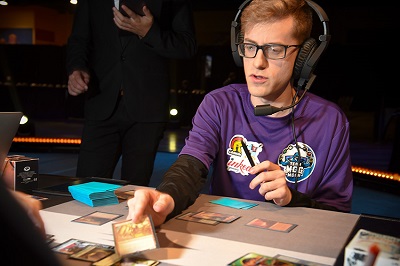
(Pronounced like “golf.”)
How he got here:
I was getting beaten up by John Rolf in Midwest PTQs before he was cool. Thankfully, law school started taking the majority of his time, which made those tournaments much easier. Since he graduated, he found time to get back into Magic, spiked Pro Tour Ixalan, and hasn’t stopped since.
Being on the big stage in the bright lights wasn’t something Rolf was used to and it caught him off guard. A competitive chess background helped teach him how to learn and he’s been utilizing that to its fullest when it comes to tackling new things, whether it’s academics or playing in a Pro Tour Top 8.
Rolf also has an incredible knack for surrounding himself with other gifted, like-minded young Magic players and improving together. Friendship has been, and will continue to be, his greatest asset.
What he’s known for:
Right now, it’s his mastery of red decks, but that will change.
Why you should follow John on Twitter:
For the memes and the sibling rivalry between him and his brother David.
Andrea Mengucci – Italy
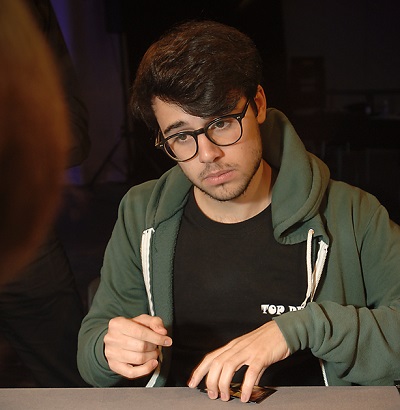
(Pronounced “on-DRAY-a.”)
How he got here:
Mengu has been around for a while, but something clicked for him at Pro Tour Journey into Nyx. Since then, he’s been qualified for every Pro Tour and has put up three PT Top 8s in a short amount of time. He’s been absolutely crushing the PTs as of late, although, oddly enough, he has yet to put up a Top 8 finish in Grand Prix.
Andrea never shies away from playing the best deck and is frequently the person to pilot that deck to the deepest run in a Pro Tour. He’s the poster boy for why “wearing the target” can still be the right choice.
What he’s known for:
An aficionado of many things, the two that stand out are Legacy and cooking, not necessarily in that order.
Why you should follow Andrea on Twitter:
Probably #menguccicuisine.
Ben Stark – United States
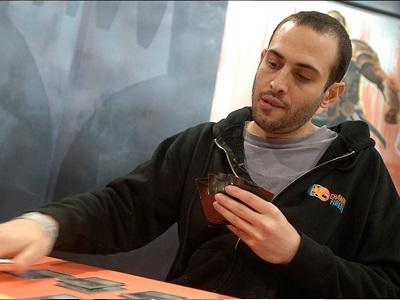
How he got here:
When Magic Online was first released, it was common knowledge to stay out of the Draft queues that BenS007 was in. However, the savvy among us realized paying Ben to inadvertently give us lessons might be worth the beating.
An early professional Magic career was halted when, as with a few others on this list, poker lured him away from for a bit. At the end of the day, Magic is his true passion and he couldn’t stay away for long. Taking a break didn’t dull his skill at all, as he quickly racked up finish after finish, including a win at Pro Tour Paris. He’s not going anywhere anymore, especially with the advent of the MPL, so you should get used to seeing him at the top tables.
What he’s known for:
Ben is one of the all-time great Limited experts and a true enigma. He’s a rare breed of human that’s almost like a robot, coldly calculating what the highest-equity play is, both in-game and in real life. Despite that, he’s also willing to incinerate hours of his life taking any discussion or argument as far as he possibly can.
Being around Ben is endlessly entertaining, whether it’s the arguments, the outlandish things he occasionally says, or the stories involving him being late for his Draft pod because he was really jonesing for a Subway sandwich.
To top it off, he’s one of the humblest people you will ever meet. All he wants to do is play good, interesting games of Magic.
Why you should follow Ben on Twitter:
He will happily respond to basically any question relating to Draft picks.
***
That’s it for Part 1! Be sure to check back the rest of this week to get to know the rest of the players.

